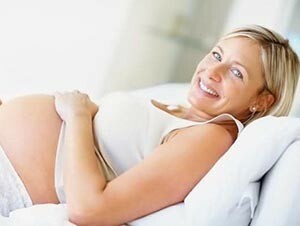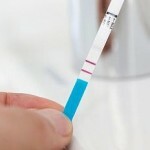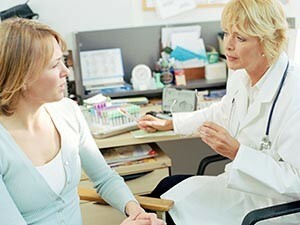Most women after the onset of menopause and stop the menstrual cycle stop taking contraceptives. However, is this correct? In this article, we will consider whether it is possible to become pregnant during menopause, as well as some aspects of the extinction of reproductive function in women.
How do the changes in a woman's body during menopause fertility function
Menopause begins atthe boundary of 45-50 years( depending on the individual characteristics of the organism) and proceeds in such stages:
-
 Premenopause. This period lasts from one to several years. The production of follicle-stimulating hormone and estrogen increases, accordingly, follicles can not ripen irregularly. There may be irregularities in the menstrual cycle, but the probability of getting pregnant at this stage is still very high.
Premenopause. This period lasts from one to several years. The production of follicle-stimulating hormone and estrogen increases, accordingly, follicles can not ripen irregularly. There may be irregularities in the menstrual cycle, but the probability of getting pregnant at this stage is still very high. - Perimenopause. Products FGS remains high, and estrogens, on the contrary, are produced less. Therefore, the probability of full ovulation significantly decreases, although the likelihood of fertilization persists. Experts believe that in this period it is possible to talk about the disappearance of reproductive function in the absence of menstruation during the year. This is important, since many women are interested in the question of whether it is possible to become pregnant with menopause, if there are no menstruation.
- Postmenopause. There is an involution of the uterus and ovaries. Production of follicle-stimulating hormone gradually decreases. It is impossible to conceive during this period, because reproductive organs are aging biologically.
Usually, at birth, and also at a later young age, the average woman has three hundred to four hundred thousand eggs. And in the period of menopause, their number drops to a thousand. However, the probability of getting pregnant still persists, because in addition to the number of eggs, there are several other necessary conditions for fertilization:
- The presence of a normally flowing ovulation. Determined by a doctor or express test, which can be purchased at the pharmacy;
- A normal hormonal background, in particular, the proper production of estrogen is required;
- Maturation of the follicle in the egg. It is determined only by special research methods.
Undesirable pregnancy during menopause
Most often, a woman accidentally becomes pregnant during menopause, as she is sure that she can not bear children any more. The signs of pregnancy in menopause are absolutely not different from those during active fertility. These are symptoms associated with gestosis, such as nausea, changes in appetite, sleep disturbance, dizziness.
However, do not forget that if a woman is in the premenopausal period, her menstrual cycle may be fuzzy, blurred or occur with periodic shifts. Therefore, the next cycle delay can be ignored.

If before the menopause the woman took combined oral contraceptives, then you can continue to take them and during the onset of menopause. But experts are inclined in this situation to prescribe medications that contain only gestagens. Certainly one - it is better to consult with your gynecologist about this.
Desired pregnancy in menopause
 In the modern world, due to a number of social factors( career, mobile work, and so on), not all women decide on the birth of a child at the optimal reproductive age( 20-40 years).
In the modern world, due to a number of social factors( career, mobile work, and so on), not all women decide on the birth of a child at the optimal reproductive age( 20-40 years).
Therefore, many women who have not been able to experience the joy of motherhood at a young age for one reason or another are interested in the question of how to become pregnant with menopause, and whether it is possible at all. The unequivocal answer is yes, if it is not post-menopause, when the reproductive organs are physiologically incapable of conception.
For this, first of all, a competent specialist( preferably a reproductive specialist or specialist of the family planning center) is needed. He will conduct all the necessary studies and screenings, if necessary, prescribe a treatment to correct the hormonal background and tell about all the features of this issue.
However, pregnancy during menopause is fraught with some pitfalls to be aware of:
- According to numerous studies, if a woman becomes pregnant after 40 years( officially such a woman is considered old-timer), the fetus significantly increases the risk of developing various genetic pathologies, up to and includingmental retardation and physical development;
- Making a decision to have children at this age, a woman should take into account such a social factor as the material support of the child. After all, in this situation, when a child reaches the age of 18, the mother will be more than 60 years old.
- It is necessary to take care of the health of the mother herself. Since pregnancy is a rather complex physiological process, even at a young age, it is not easy for many to go through, in adulthood this can cause a significant deterioration in the condition. In connection with this, such a woman will need to be treated with great attention to health, nutrition, rest. And it is even better to be constantly under the supervision of a specialist.
Despite this, the achievements of modern medicine can successfully prevent such negative effects, and timely genetic screening and 3D ultrasound - knowingly recognize the possibility of malformations.
If there is evidence for this, the woman can also consider the option of surrogate motherhood or artificial insemination. It is true that in many countries of the West such practices are very cautious, in view of the many features and pitfalls in the course of this pregnancy. Therefore, again, it is mandatory to consult a specialist in this field.
The most successful, of course, is pregnancy in the early menopause, or in the period of premenopause.

It can be:
- Hot flushes, thermoregulation disorders, excessive sweating or periodic chills;
- Emotional lability, mood swings, unmotivated hysteria or tears;
- Discomfort in the pelvic region, perineum, urethra.
According to the research of American scientists, up to half of women aged 40-45 years retain the ability to become pregnant. At the same time, at this age the statistical frequency of sexual acts and ovulation significantly decreases, but in some women at this age libido increases, and sometimes even a new sexual partner appears.
 We recommend that you read an article about the differences between menopause and pregnancy. You will learn about the difference in the composition of hormones under these conditions, sensations and well-being of a woman, the appropriateness of using a pregnancy test.
We recommend that you read an article about the differences between menopause and pregnancy. You will learn about the difference in the composition of hormones under these conditions, sensations and well-being of a woman, the appropriateness of using a pregnancy test.
Artificial menopause
 The question remains topical, like pregnancy after an artificial menopause. With quite a few pathologies, women are prescribed treatment that introduces their body into a state of artificial menopause with all the resulting symptoms.
The question remains topical, like pregnancy after an artificial menopause. With quite a few pathologies, women are prescribed treatment that introduces their body into a state of artificial menopause with all the resulting symptoms.
It is important to remember that artificial menopause is quite a serious shift in terms of the woman's overall hormonal health. After this, a long recovery period may be required, even if all symptoms disappear( as the ovaries need time to reach the pre-climacteric level of secretion).
But nevertheless, with adequate care of a specialist and restorative therapy, a woman has all chances of conception and subsequent pregnancy.
Thus, it becomes evident that, thanks to the development of medical science in the menopause period, it is possible to successfully conceive( if there was not such an opportunity before).On the other hand, women, for whom such pregnancy is undesirable, it is necessary to remember that fertility can last several years after the onset of menopause, and consult with your gynecologist about methods of contraception.
